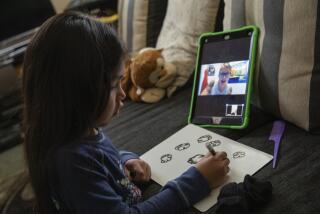Study Finds Racial Divide Among Internet Users
- Share via
At a time when the Internet is growing faster than any other communications system in history, there is a “troubling” racial divide in how readily blacks can access the global computer network, researchers said Thursday.
In the first survey of its kind, a team of Vanderbilt University management experts compared computer use among whites and African Americans. They found that even among people with equal education and income, whites were much more likely to own a home computer and to regularly use the World Wide Web--a popular Internet network, encompassing some 62 million Americans, that is revolutionizing business and education.
The digital divide was greatest among high school and college students, the Vanderbilt researchers found.
“The gap is huge,” said Stanford University telecommunications expert Francois Bar, who studies Internet access. “It reinforces inequalities.”
Experts said the disparity in Web use means that many blacks are not part of a rapidly growing arena of commerce, employment opportunity and learning. Computer-related industries expect to hire 1.3 million workers in the next decade.
But the gap also has “worrisome” implications for the continuing development of the Internet itself, which depends heavily on its users for innovations.
“It has a detrimental effect for everybody, not just minorities,” Bar said. “By shutting out a significant portion of the population, you are restricting the source of potential good ideas about what the Internet should be in the future.”
Although students overall are most likely to use the Web, the study found that white students were more than twice as likely to own a home computer, even when household income was taken into account. Less than one-third of black students owned a home computer, compared to almost three-quarters of the white students, according to the study, which is published today in Science.
And white students who did not own a home computer still were more likely to access the Web from other locations, the researchers said. They were three times more likely to have used the Web recently than black students in the same situation.
Internet experts have long worried about the plight of “information have-nots” in a country that rapidly is becoming a wired nation in which Internet traffic is doubling every 100 days.
But until now, researchers had assumed that any inequality in Internet access could be explained by differences in income and the ability to afford expensive personal computers, modems and online connection fees.
Indeed, America’s growing digital citizenry typically is wealthier and better educated than the average American. More than 42 million Americans do not own a computer, and at least 12 million have never heard of the Internet, industry surveys show.
Several experts, however, said they were surprised that the racial gap persisted even when incomes were equal.
“This is the most disturbing instance yet of when race matters in Internet access,” said the researchers at Vanderbilt’s Owen Graduate School of Management, who added that they were at a loss to explain the disparity. “The consequence to U.S. society of a persistent racial divide on the Internet may be severe.”
Even so, there are some signs that the situation may change.
Nearly twice as many African Americans as whites said they planned to purchase a home computer in the next six months. Well-educated, affluent blacks were more likely than whites of similar income to have a computer at work. And there were no differences in Internet use and Web-surfing when African American students did have a computer at home. The new survey shows that about 5 million African Americans are surfing the World Wide Web, compared to 41 million whites.
The researchers said the survey highlights the urgent need to create access points in libraries, community centers and other neighborhood gathering places where blacks who cannot get on the Internet at home can go online.
“They want to participate, but there are barriers,” said Donna Hoffman, the Vanderbilt management expert who conducted the survey.
“Blacks have just as much interest [in the Internet], but often their communities do not offer these access opportunities and it is expensive to travel to those areas that do,” she said.
Already, at least 78% of all U.S. public schools have linked to the Internet, but in schools where more than two-thirds of students are either minorities or eligible for reduced-price lunches, that number drops to 63%.
Responding to pressure to broaden access, the Federal Communications Commission vowed Thursday to reorganize its $2.25-billion program subsidizing Internet connections for schools, libraries and rural health care providers. The program has already received more than 45,000 applications.
But the new research suggests that linking schools to the Internet may not be enough.
“Our research has shown very clearly that you have to get the Internet into the home, where you are much more likely to use the Web,” Hoffman said.
(BEGIN TEXT OF INFOBOX / INFOGRAPHIC)
Limited Access
A new survey has found that whites are much more likely than blacks to own a home computer and have access to the World Wide Web.
*--*
Ever used the Web... Own a home ...at ...at ...at computer home work school All whites 44.3% 14.7% 11.1% 7.2% All Blacks 29.0% 9.0% 8.4% 10.5% White Students 73.0% 33.3% 8.8% 45.5% Black Students 31.9% 13.0% 2.0% 42.8%
*--*
Source: Vanderbilt University






